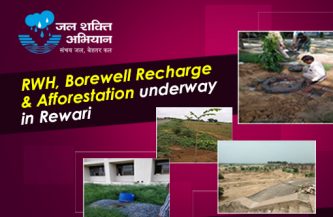Mulching, SRI cultivation, Micro Irrigation seen in West Godavari

The district of West Godavari in Andhra Pradesh has adopted a number of best practices such as mulching, adopting of traditional rice cropping methods (System of Rice Intensification (SRI) cultivation) and micro irrigation to ensure water use efficiency.

The practices are in keeping with the ongoing Jal shakti Abhiyan (JSA) under which interventions in the areas of water conservation and rainwater harvesting; renovation of traditional water bodies/tanks; reuse borewell recharge structures; watershed development and intensive afforestation are being undertaken across the country.
Mulching with Cocoa leaves in Oil Palm/Coconut plantation system: Given that the water intensive rice is the main crop cultivated in West Godavari District, commercial horticulture crops are being promoted in a big way. Today, about 26% of the sown area has Oil Palm and Coconut plantations. The former though introduced only in 1989, now covers about 66,000 hectares. Farmers of the region are raising Oil Palm along with coconut gardens in 1.23 lakh hectares, both of which are water intensive crops. For example, 2.5 mm of water (2.5 lakh litres) is required for one hectare of coconut plants and 3.6 mm of water (3.6 lakh litres) is required for one hectare for Oil Palm plants.
Under such circumstances, the Government of Andhra Pradesh has introduced mulching with Cocoa leaves in Oil Palm/Coconut gardens, called as organic mulching for conservation of water. It is to note that in one hectare area, Cocoa plants shed upto 3 tons of leaves in a year. The large number of fallen leaves on the ground, act as a conservation agent as they impede water flow during the rains. This has beneficial impact on ground water recharge contributing to the percolation process

In this system the leaves of Cocoa are used for mulching in Oil Palm and Coconut plants. Under JSA, farmers are being motivated and encouraged to move into organic mulching system and made aware of the benefits i.e., reducing evaporation, retaining moisture, reducing soil erosion, suppressing weed growth and providing plant nutrients as the material decomposes.
According to the JSA team that visited the district recently, farmers of Pedavegi and Jangareddygudem Mandals have demonstrated a great attitude, willing to take up the new method in a big way. Currently, organic mulching is being done by the farmers in Oil Palm and Coconut gardens with inter crop of Cocoa across 3629 ha in Pedavegi Mandal and 657 ha in Jangareddygudem Mandal.
Meanwhile, in Jangareddygudem Mandal, the State Government nursery plans to distribute 10,00,000 Cocoa saplings to promote this practice which apart from the benefits mentioned earlier adds to Cocoa produce which is in high demand by the Chocolate industry. The practice therefore results in a win-win solution.
Promotion of traditional rice cropping methods or SRI cultivation: During Khariff -2019, farmers of the district have cultivated paddy across an area of 2,26,950 Ha. They generally depend on flood irrigation through bore wells in their fields. It is common knowledge that extensive use of bore wells has grave implication on ground water table. Further, water consumption in conventional paddy fields is nearly two times greater than the normally suggested crop water requirement of 12,500 m3/ha in paddy.
Traditionally, farmers of that area, being well aware of water conservation issues, have indulged in paddy cultivation practices which were less water intensive. Known as System of Rice Intensification (SRI) cultivation, the technique is not practiced any more owing to availability of free power and constraints in the availability of labour. Weed management is another issue that needs to be kept in mind while deploying this water efficient cropping pattern. However, evidence indicates that there is potential of 40- 47% reduction in water-use with SRI, 68-94% increase in water use efficiency, and 100-130% increase in irrigation compared to traditional flooding.

With increased pressure on water bodies, under JSA, farmers are being sensitized about the benefits of this labour intensive and water saving technique which has disappeared from the region.
Extensive use of Micro Irrigation: Farmers of the upland area of West Godavari have been raising horticultural crops such as oil palm, coconut, vegetables, acid lime, banana, etc., across 1.23 lakh hectares, even though maize and groundnut remain the major crops of the district. Generally, farmers depend on flood irrigation in their fields, using more water for farming Oil Palm and Coconut. For example – 2.5 mm of water (7,000 litres) is required for one acre of coconut plants; 3.5 mm of water (9,000 litres) is required for one acre for Oil Palm plants; 6.00 mm of water (6 lakh litres) is required for Banana; 7.00 mm of water (7 lakh litres) is required for one hectare of Maize and 8.00 mm of water (8 lakh litres) is required for vegetables.
Given these circumstances, the Government of Andhra Pradesh has encouraged farmers to install Micro Irrigation Systems, namely Drip and Sprinkler Irrigation for conservation of water.
Micro Irrigation is defined as the frequent application of water in small quantities directly above or below the soil surface usually as discrete drops, continuous drops, tiny streams or micro spray.
Dri/Sprinkler Irrigation System on the other hand will be provided on subsidy to farmers whereever assured irrigation sources are available such as – Bore Wells, Open Wells, and Farm Ponds etc. The benefits of this system is that it saves ground water up to 100%, improves productivity by 20-40%, saves electricity consumption upto 45% when compared to traditional irrigation, and saves labour on weeding, fertilizers (65%).
[ The Blog was first published on https://jalshakti.wordpress.com ]





